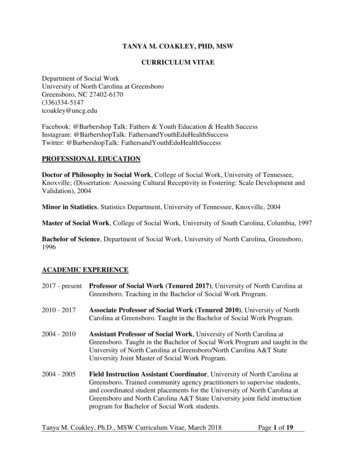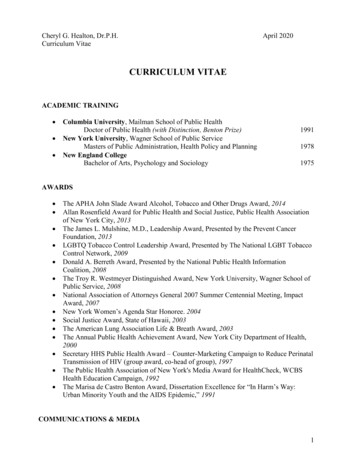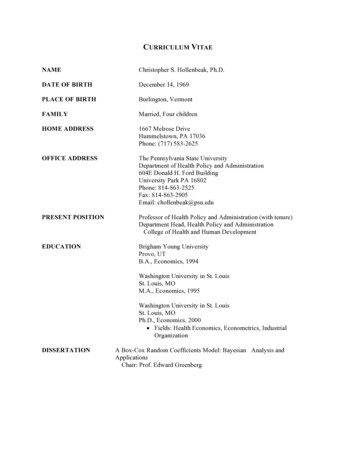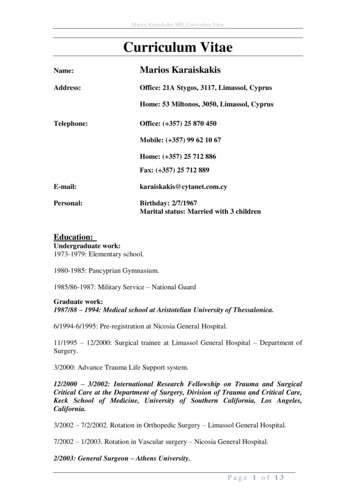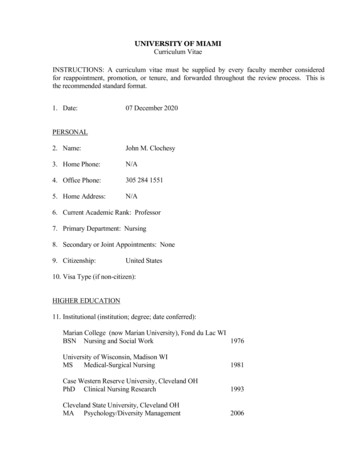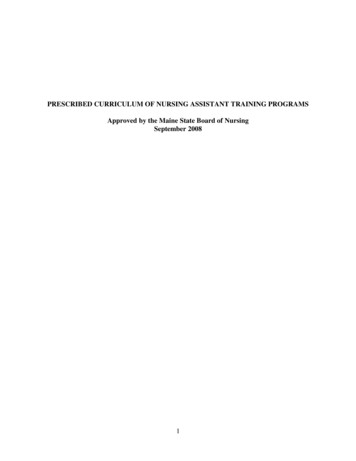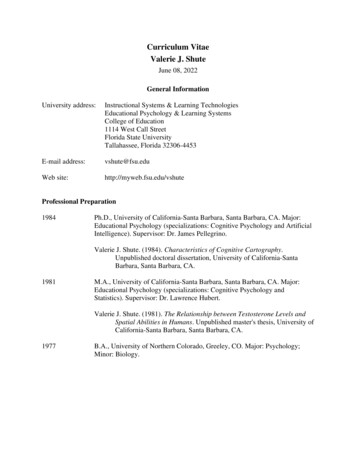
Transcription
Curriculum VitaeValerie J. ShuteJune 08, 2022General InformationUniversity address:Instructional Systems & Learning TechnologiesEducational Psychology & Learning SystemsCollege of Education1114 West Call StreetFlorida State UniversityTallahassee, Florida 32306-4453E-mail address:vshute@fsu.eduWeb site:http://myweb.fsu.edu/vshuteProfessional Preparation1984Ph.D., University of California-Santa Barbara, Santa Barbara, CA. Major:Educational Psychology (specializations: Cognitive Psychology and ArtificialIntelligence). Supervisor: Dr. James Pellegrino.Valerie J. Shute. (1984). Characteristics of Cognitive Cartography.Unpublished doctoral dissertation, University of California-SantaBarbara, Santa Barbara, CA.1981M.A., University of California-Santa Barbara, Santa Barbara, CA. Major:Educational Psychology (specializations: Cognitive Psychology andStatistics). Supervisor: Dr. Lawrence Hubert.Valerie J. Shute. (1981). The Relationship between Testosterone Levels andSpatial Abilities in Humans. Unpublished master's thesis, University ofCalifornia-Santa Barbara, Santa Barbara, CA.1977B.A., University of Northern Colorado, Greeley, CO. Major: Psychology;Minor: Biology.
Vita for Valerie J. ShuteNondegree Education and Training1984–1986Post-doctoral fellowship. University of Pittsburgh, Learning Research andDevelopment Center (LRDC), Pittsburgh, PA. Advisor: Dr. Robert Glaser.Design and development of intelligent tutoring systems.Professional Experience2022–presentProfessor Emerita, Department of Educational Psychology and LearningSystems, Florida State University.2011–2021Professor, Instructional Systems Program, Educational Psychology andLearning Systems Department, Florida State University. conductingindependent and collaborative research; writing grants and securing externalfunding; presenting at national and international conferences; teachinggraduate classes; advising students; and serving on department, college, anduniversity committees.2007–2011Associate Professor, Instructional Systems Program, Educational Psychologyand Learning Systems Department, Florida State University. Responsibilitiesinclude conducting independent and collaborative research; writing grants andsecuring external funding; presenting at national and internationalconferences; teaching graduate classes; advising students; and serving ondepartment, college, and university committees.2007Adjunct Instructor, Educational Psychology and Learning SystemsDepartment, Florida State University.2001–2007Principal Research Scientist, Research & Development, Educational TestingService (ETS), Princeton, NJ. Responsible for designing, developing, andevaluating basic and applied research projects related to: assessment,cognitive diagnosis, and learning using innovative instructional interventionsand measurement methodologies.2000–2001Senior Research Scientist, Research & Development, KnowledgePlanet.com,Emeryville, CA. Responsible for conducting research and developmentactivities relating to the design of advanced training technologies and studentmodeling efforts (cognitive and noncognitive attributes).1999–2000Director of Research & Development, GKIS, Inc., Houston, TX. Responsiblefor research plans and projects related to developing and evaluating intelligentinstructional and training systems as well as managing the laboratory.1986–1999Senior Research Scientist, Air Force Research Laboratory, San Antonio, TX.Responsible for conducting basic and applied research in the areas ofPage 2
Vita for Valerie J. Shuteintelligent tutoring systems, student modeling algorithms, knowledgeelicitation programs, and other basic science research on learning, instruction,and training.1981–1984Teaching Assistant, UCSB. Taught graduate students in Artificial Intelligencecourse at UCSB; Introductory Statistics course to graduate students at AntiochUniversity (Santa Barbara, CA), and tutored Advanced Statistics to graduatestudents at UCSB.1979–1984Research Assistant, Educational Psychology department, UCSB. Multipleprojects including: comprehension of complex spatial visualization tasks,effects of extended practice on spatial skills; modeling and simulatingnavigational skills; and developing process models of spatial cognition.Honors, Awards, and PrizesTop 1000 U.S. scientists for Social Sciences and Humanities iences-and-humanities/us), Research.com (2022).Forbes magazine Interview: Creativity research with vityvideo-games-might-be-theanswer/?sh 52461c14ea4a&fbclid IwAR01XIrI5SZ7GEaTaoRVFU4Vw) (2020).NPR Interview: Should This Exist? Tech alternatives to the ) (2020).Best Student Paper Award--Eloy, L., Stewart, A., Amon, M. J., Reinhardt, C., Michaels, A., Sun,C., Shute, V. J., Duran, N., & D'Mello, S. K. (2019). Modeling team-level multimodaldynamics during multiparty collaboration. In L. Wang & X. Chai (Ed.), ICMI 2019(2019).Featured in the APA Monitor (https://tinyurl.com/y2djn6gm), American PsychologicalAssociation (2019).2017 Outstanding International Research Collaboration Award--LEADS research, AERA(Technology, Instruction, Cognition, and Learning SIG) (2017).Transformation Through Teaching Award, Florida State University (2017).FSU Graduate Faculty, Teaching Excellence award (nomination), Florida State University(2016).National Education Technology Plan, Dept. of Education (2016).Best Paper Award, 17th International Conference on Artificial Intelligence in Education (2015).Best Student Paper Award, 17th International Conference on Artificial Intelligence in Education(2015).FSU Graduate Faculty Mentor Award, Florida State University (2015).FSU Innovators Award for licenses and commercialization of Physics Playground, Florida StateUniversity (2015).Featured article (January-February 2014) Valerie J. Shute, A Significant Contributor to the Fieldof Educational Technology, Educational Technology, by L. McCalla & T. Reeves (2014).Featured article (September 2014) in Popular Science: Portal 2 Improves Cognitive Skills MorePage 3
Vita for Valerie J. ShuteThan Lumosity Does, Study Finds, by Francie Diep, Popular Science (2014).Featured story (August 2014), New partnership uses video games to teach physics, by KathleenHaughney, FSU-News (2014).Featured presentation at the Brookings Institute on Assessment in games, Brookings Institute(2013).Innovator Award, FSU Office of Commercialization and the FSU Research Foundation (2013).Featured article on stealth assessment research in the Washington Monthly Magazine (2012).Featured presentation on Personal Passport of Competencies, Gordon Commission meetinghosted by Arizona State University (2012).George A, Miller Award (nominated), APA: General Psychology Division for 2010 article byLee & Shute (2012).Mack and Effie Campbell Tyner Endowed Professorship in Education (2012).Featured article on Gates research grant (2011).U.S. Patent #7,828,552 (Method and System for Designing Adaptive, Diagnostic Assessments),USPO (2010).Featured article about stealth assessment research in the Chronicle of Higher Ed (2010).NPR interview on Quest to Learn research funded by the MacArthur Foundation (2010).Nomination for FSU teaching award, Florida State University (2009).Family Market Initiative award, for contributions to the new consumer-market initiative,Educational Testing Service (2007).Nugget award showcasing my research project called ACED supporting mathematics learningfor sighted and visually disabled students, National Science Foundation (2006).K-12 Solutions award for contributions to suite of assessment and reporting tools called "Product2", Educational Testing Service (2003).Star Team award for Excellence in Basic Research, awarded to one research project/team peryear, awarded in 1999/1996/1993/1991, A.F. Office of Scientific Research, Washington,DC (1999).Science & Technology award & induction, Women’s Hall of Fame, San Antonio, TX (1998).Science & Engineering award for "Significant contributions in exploratory and advancedtechnology development in support of the AF Mission", U.S. Air Force (1997).Civilian of the Year award, directorate wide competition, one winner per year selected, awardedin 1996/1993/1992, U.S. Air Force (1996).Scientific Excellence award, directorate wide competition, one winner per year selected, awardedto me twice--1996/1993, U.S. Air Force (1996).Book of the Year award for Cognitive Approaches to Automated Instruction, Edited by J.Wesley Regian and Valerie J. Shute, DID (Division of Instructional Development of theAECT) (1995).Best instructional innovation award for “Smithtown” program (Shute, Raghavan, Glaser,Schauble & Schultz), EDUCOM/IBM (1992).Best social-sciences software award for “Smithtown” program (Shute, Raghavan, Glaser,Schauble & Schultz), EDUCOM/IBM (1992).Civilian of the Quarter award, laboratory wide competition, one winner per quarter selected, U.S.Air Force (1990).Chief Scientist award, U.S. Air Force (1989).Recipient of the "Sustained Superior" or "Sustained Excellent" performance awards each year ofmy 13-year tenure at the A.F. laboratory (1986-1999), U.S. Air Force (1986).Page 4
Vita for Valerie J. ShuteResearch Award, Central Research Fund, University of Pittsburgh (1985).Humanities Grant Research Award, University of California (1984).Graduate Opportunity Fellowship, University of California (1983).Sigma Xi Award, Grant in Aid of Research, University of California (1982).Regent's Award for Outstanding Research, University of California (1981).K.A. Seefield Award, "Outstanding Educator", University of California (1979).Elected Fellow StatusElected as a Fellow of International Society for Design and Development in Education (2019).Current Membership in Professional OrganizationsAmerican Educational Research Association (AERA)Artificial Intelligence in Education (AIED)International Educational Data Mining Society (IEDMS)Technology, Instruction, Cognition, and Learning (TICL)TeachingCourses TaughtApplication of Research Methods to Learning Design & Performance Technology (EME6064)Inquiry and Measurement for Practitioners (EDF5442)Modeling Persistence (EDF5906)Synthesis, Analysis, and Argumentation in Instructional Systems Research (EME6665)Analysis of Behavioral Rating Technology (EDF5906)Conducting Research on Task-based Learning (EDF5906)Practicum in Learning Research (EDG6363)Inquiry and Measurement in Instructional System Design (EME6635-06)Review of Games Supportig Prog (EDF5906)Directed Individual Study (EDF5906)Seminar in Advanced Instructional Systems Problems (EME6635)Assessment Seminar: Advanced Topics in Assessment (EDF6937-05)Seminar in Advanced Research Problems (EDF6937)Research Foundations: Literature Review (EME6635-02)Instructional Systems Research Colloquium (EME6635-05)Theories of Learning and Cognition in Instruction (EDP5216)Trends and Issues in Instructional Design (EME5608)Experimental Psychology (Instructor, University of Texas, San Antonio, 1992-1993)Individual Differences in Learning (University of Pittsburgh, Pittsburgh, PA, 1985)Introductory Statistics (Instructor, Antioch University, Santa Barbara, CA, 1983-1984)Artificial Intelligence (TA, University of California, Santa Barbara, CA, 1982-1984)Page 5
Vita for Valerie J. ShuteAdvanced Statistics (TA, University of California, Santa Barbara, CA,1981-1984)New Course DevelopmentApplication of Research Methods to Learning Design & Performance Technology (2019)Assessment for Practitioners (2017)Practicum in Learning Research (2015)Synthesis, Analysis, and Argumentation in Instructional Systems Research (2012)Assessment Seminar: Advanced Topics in Assessment (2010)Research Foundations: Literature Review (2009)Inquiry and Measurement in Instructional System Design (2008)Doctoral Committee ChairSun, C., graduate. (2021).Lu, X., graduate. (2021).Smith, G., graduate. (2021).Rahimi, S., graduate. (2020).Feulner, M., graduate. (2020).Huang, Y., graduate. (2018).Emihovich, B. W., graduate. (2017).Wang, L., graduate. (2017).Zhao, W., graduate. (2017).Moore, G. R., graduate. (2016). [EdS]Masduki, I., graduate. (2015).McGhee, M. L., graduate. (2015).Kim, Y. J., graduate. (2014).Dorn, R. L., graduate. (2014).Kim, A., graduate. (2010).Wang, Chen-yen, graduate. (2010). [EdS]Fulwilder, G. C., doctoral candidate.Orris, S., doctoral candidate.Verity, E., doctoral candidate.Yang, X., doctoral student.Doctoral Committee MemberPhillips, J., graduate. (2021).Dai, Z., graduate. (2020).Liu, Z., graduate. (2020).Carafano, P., graduate. (2019).Xu, X., graduate. (2017).Lee, S., graduate. (2016).Page 6
Vita for Valerie J. ShuteSaenz Moncaleano, C. C., graduate. (2016).Hand, K. G., graduate. (2015).Kim, H. Y., graduate. (2015).Wu, H., graduate. (2013). [measurement & stats]Barber, K. A., graduate. (2013).Lee, W. J., graduate. (2012).Novak, E., graduate. (2012).Sota, M., graduate. (2012).Hyun, O. J., graduate. (2012). [Visual Arts, Theatre, and Dance]Razzouk, R. G., graduate. (2011).Wieland, K. I., graduate. (2011).Sikorski, E., graduate. (2009).Johnston, R. C., doctoral candidate.Dai, Chih-pu, doctoral candidate.Kent, H., doctoral candidate.Doctoral Committee University RepresentativeSteinrücke, J., graduate. (2021).Arbulu, M., graduate. (2021).Agharazidermani, M., graduate. (2021).Harrell, E., graduate. (2019).Small, M. T., graduate. (2012). [computer science]Koh, K., graduate. (2011). [Information Sciences, FSU]Olumide, K. M., graduate. (2010). [Statistics Dept., FSU]O, J. H., graduate. (2010).Harwell, K., doctoral candidate.Master's Committee ChairBaxter, S., graduate. (2021).Tate, D., graduate. (2021).Brown, A., graduate. (2020).Cunningham, A., graduate. (2020).Grubb, C., graduate. (2020).Howard, L., graduate. (2020).Princi, E., graduate. (2020).Rist, A., graduate. (2020).Thorpe, J., graduate. (2020).Troutman, R., graduate. (2020).Youngblood, C., graduate. (2020).Downing, J. C., graduate. (2018). [IS/online]Silvers, C., graduate. (2018).Screws, B. E., graduate. (2017). [IS/F2F]Page 7
Vita for Valerie J. ShuteBedgio, D., graduate. (2016). [IS/F2F]Blauer, D. D., graduate. (2016).Davis, L., graduate. (2016). [IS/online]Steele, G. R., graduate. (2016). [IS/online]Weiss, M. K., graduate. (2016). [IS/online]Beauford, S. N., graduate. (2015). [IS/online]Donmez, O., graduate. (2015). [IS/F2F]Kim, J. R., graduate. (2015). [IS/F2F]Pasi, A., graduate. (2015). [IS/F2F]Taylor, B. H., graduate. (2015). [IS/online]Worley, S. C., graduate. (2015). [IS/online]Schatz, C., graduate. (2014). [IS/online]Long, C. M., graduate. (2014).Weaver, S., graduate. (2014). [IS/F2F]Surrency, M., graduate. (2014). [IS/online]Silverman, L. R., graduate. (2013). [PI/HRD]Brown, K. D., graduate. (2013). [IS/F2F]Collins, E. A., graduate. (2013). [IS/F2F]O'Donnell, L. A., graduate. (2013). [IS/F2F]Arnold, M. W., graduate. (2012). [PI/HRD/online]McGuire, C. J., graduate. (2012).Chen, W., graduate. (2012).Jackson, S. J., graduate. (2012). [IS/F2F]Halderman, D. E., graduate. (2011).Johnson, C. R., graduate. (2011).Ng, G. J., graduate. (2011). [MS/F2F]Henderson, J. C., graduate. (2011).McCann, C. J., graduate. (2011).Jacobs, A. H., graduate. (2010).Torres Luna, L. F., graduate. (2010).Wendel, C., graduate. (2010).Boulanger, J. D., graduate. (2010).Fong, K. W., graduate. (2009).Albrecht, L., graduate. (2009).Middleton, A. M., graduate. (2009).Master's Committee MemberSouders, D. J., graduate. (2013). [Psychology Dept]Bachelor's Committee MemberBayles, M., graduate. (2017). Malleability of measures of cognitive ability. [Psychology Dept.,Page 8
Vita for Valerie J. ShuteHonors Thesis]Carroll, M., graduate. (2014). [Psychology Dept., Honors Thesis]Summer, A., graduate. (2014). [Psychology Dept., Honors Thesis]Blocker, K., graduate. (2013). [Psychology Dept., Honors Thesis]Exum, A., student. [honor's thesis committee member]Supervision of Student Research Not Related to Thesis or DissertationVutera, G. (2015–17).Research and Original Creative WorkPublicationsRefereed Journal ArticlesBainbridge, K., Smith, G., Shute, V. J., & D'Mello, S. (in press). Designing and testing affectivesupports in an educational game. International Journal of Game-Based Learning, 49pages.Bainbridge, K., Shute, V. J., Rahimi, S., Liu, Z., Slater, S., Baker, R. S., & D'Mello, S. (2022).Does embedding learning supports enhance transfer during game-based learning? A casestudy with Physics Playground. Learning and Instruction, 77, 21.101547Smith, G., Fulwider, G. C., Liu, Z., Lu, X., Li, J., & Shute, V. J. (2022). Examining students'perceived competence, gender, and ethnicity in a digital STEM learning game.International Journal of Game-Based Learning, 12(1), 1-17. doi:10.4018/ijgbl.294013Yang, X., Rahimi, S., Fulwider, G. C., Smith, G., & Shute, V. J. (2022). Exploring students'behavioral patterns when playing educational games with learning supports at differenttimings. Educational Technology Research and Development, 9Sun, C., Shute, V. J., Stewart, A. E. B., Beck-White, Q., Reinhart, C. R., Duran, N., & D'Mello,S. (2021). The relationship between collaborative problem solving processes andobjective outcomes in a game-based learning environment. Computers in HumanBehavior, 128, 1-14.Rahimi, S., & Shute, V. J. (2021). First inspire, then instruct to improve students' creativity.Computers & Education, 174, 1-27. uba, R., Rahimi, S., Smith, G., Shute, V. J., & Dai, C-P. (2021). Using the first principles ofinstruction and multimedia learning principles to design and develop in-game learningPage 9
Vita for Valerie J. Shutesupport videos. Educational Technology Research and Development, 69, 9994-3Rowe, E., Asbell-Clarke, J., Almeda, M. V., Gasca, S., Edwards, T., Bardar, E., Shute, V., &Ventura, M. (2021). Interactive Assessments of CT (IACT): Digital Interactive LogicPuzzles to Assess Computational Thinking in Grades 3–8. International Journal ofComputer Science Education in Schools, 5(2), Shute, V. J., & Rahimi, S. (2021). Stealth assessment of creativity in a physics educational game.Computers in Human Behavior, 116, 1-13. i, S., Shute, V. J., & Zhang, Q. (2021). The effects of game and student characteristics onpersistence in educational games: A hierarchical linear modeling approach. InternationalJournal of Technology in Education & Science, 5(2), , X., Rahimi, S., Shute, V. J., Kuba, R., Smith, G., & Alonso Fernández, C. (2021). Therelationship among prior knowledge, accessing learning supports, learning outcomes, andgame performance in educational games. Educational Technology Research andDevelopment, 69, 1055-1075. mi, S., Shute, V. J., Kuba, R., Dai, C-P., Yang, X., Smith, G., Alonso Fernández, C., &Fulwider, G. (2021). The use and effects of incentive systems on learning andperformance in educational games. Computers & Education, 165, 35Shute, V. J., Rahimi S., Smith, G., Ke, F., Almond, R., Dai, C-P, Kamikabeya, R., Liu, Z., Yang,X., & Sun, C. (2020). Maximizing learning without sacrificing the fun: Stealthassessment, adaptivity, and learning supports in Physics Playground. Journal ofComputer-Assisted Learning, 37, 127-141. doi:10.1111/jcal.12473Shute, V. J., Smith, G., Kamikabeya, R., Dai, C-P., Rahimi, S., Liu, Z., & Almond, R. G. (2020).The design, development, and testing of learning supports for the Physics Playgroundgame. International Journal of Artificial Intelligence in Education, un, C., Shute, V. J., Stewart, A., Yonehiro, J., Duran, N., & D'Mello, S. (2020). A generalizedcompetency model of collaborative problem solving. Computers & Education, 143, hao, W., & Shute, V. J. (2019). Can playing a video game foster computational thinking skills?Computers & Education, 141, 1-13. doi:https://doi.org/10.1016/j.compedu.2019.1Page 10
Vita for Valerie J. ShuteSmith, G., Shute, V. J., & Muenzenberger, A. (2019). Designing and validating a stealthassessment for calculus competencies. Journal for Applied Testing Technology, 20(S1),1-8.Spann, C., Shute, V. J., Rahimi, S., & D'Mello, S. (2019). The productive role of cognitivereappraisal to regulate frustration during game-based learning. Computers in HumanBehavior, 100, 358-369. doi:https://doi.org/10.1016/j.chb.2019.03.00Shute, V. J., Sun, C., & Asbell-Clarke, J. (2017). Demystifying computational thinking.Educational Research Review, 22, 142-158. doi:https://doi.org/10.1016/j.edurev.2017.09Shute, V. J., & Rahimi, S. (2017). Review of computer-based assessment for learning inelementary and secondary education. Journal of Computer-Assisted Learning, 33, 1-19.doi:10.1111/jcal.12172Shute, V. J., Leighton, J. P., Jang, E. E., & Chu, M-W. (2016). Advances in the science ofassessment. Educational Assessment, 21(1), 34-59.Kim, Y. J., Almond, R. G., & Shute, V. J. (2016). Applying Evidence-Centered Design for thedevelopment of game-based assessments in Physics Playground. International Journal ofTesting, 16(2), 142-163. doi:10.1080/15305058.2015.1108322Shute, V. J., Wang, L., Greiff, S., Zhao, W., & Moore, G. (2016). Measuring problem solvingskills via stealth assessment in an engaging video game. Computers in Human Behavior,63, 106-117.Bosch, N., D'Mello, S. K., Ocumpaugh, J., Baker, R. S., & Shute, V. J. (2016). Using video toautomatically detect learner affect in computer-enabled classrooms. ACM Transactionson Interactive Intelligent Systems, 6(2), 1-26. doi:http://dx.doi.org/10.1145/2946837Wang, L., Shute, V. J., & Moore, G. (2015). Lessons learned and best practices of stealthassessment. International Journal of Gaming and Computer Mediated Simulations, 74(4),66-87. doi:DOI: 10.4018/IJGCMS.2015100104Shute, V. J., D'Mello, S. K., Baker, R., Bosch, N., Ocumpaugh, J., Ventura, M., & Almeda, V.(2015). Modeling how incoming knowledge, persistence, affective states, and in-gameprogress influence student learning from an educational game. Computers & Education,86, 224-235.Kim, Y. J., & Shute, V. J. (2015). The interplay of game elements with psychometric qualities,learning, and enjoyment in game-based assessment. Computers & Education, 87, 340356.Page 11
Vita for Valerie J. ShuteShute, V. J., Ventura, M., & Ke, F. (2015). The power of play: The effects of Portal 2 andLumosity on cognitive and noncognitive skills. Computers & Education, 80, 58-67.doi:10.1016/j.compedu.2014.08.013Novak, E., Johnson, T. E., Tenebaum, G., & Shute, V. J. (2014). Effects of an instructionalgaming characteristic on learning effectiveness, efficiency, and engagement: Using astoryline for teaching basic statistical skills. Interactive Learning Environments, 1-16.Almond, R. G., Kim, Y. J., Velasquez, G., & Shute, V. J. (2014). How task features impactevidence from assessments embedded in simulations and games. Measurement:Interdisciplinary Research and Perspectives, 12(1-2), 1-33.doi:10.1080/15366367.2014.910060Almond, R. G., Kim, Y. J., Velasquez, G., & Shute, V. J. (2014). Rejoinder to comments on taskfeatures in simulations and games. Measurement: Interdisciplinary Research andPerspectives, 12(3), 118-124. doi:10.1080/1536637.2014.939628Shute, V. J., Ventura, M., Wright, T., & Zhao, W. (2013). An investigation of the validity of thevirtual spatial navigation assessment. Frontiers in Psychology, 4, 53-59.doi:10.3389/fpsyg.2013.00852Shute, V. J., Ventura, M., & Kim, Y. J. (2013). Assessment and learning of informal physics inNewton's Playground. The Journal of Educational Research, 106, 423-430.Shute, V. J., Ventura, M., & Torres, R. (2013). Formative evaluation of students at Quest toLearn. International Journal of Learning and Media, 4(1), 55-69.Dawkins, J. D., & Shute, V. J. (2013). Stars vs. clouds: Crafting creative collaborative commons.International Journal of Designs for Learning, 4(2), 15-29.Ventura, M., & Shute, V. J. (2013). The validity of a game-based assessment of persistence.Computers and Human Behavior, 29, 2568-2572.Ventura, M., Shute, V. J., & Zhao, W. (2012). The relationship between video game use and aperformance-based measure of persistence. Computers & Education, 60, 52-58.Ventura, M., Shute, V. J., & Kim, Y. J. (2012). Video gameplay, personality and academicperformance. Computers & Education, 58, 1260-1266.Razzouk, R., & Shute, V. J. (2012). What is design thinking and why is it important? Review ofEducational Research, 82(3), 330-348.Shute, V. J., Hansen, E. G., Underwood, J. S., & Razzouk, R. (2011). A review of the influenceof parental involvement on secondary school students' academic achievement. EducationResearch International, 1-10.Page 12
Vita for Valerie J. ShuteHansen, E. G., Shute, V. J., & Landau, S. (2010). An assessment-for-learning system inmathematics for individuals with visual disabilities. Journal of Visual Impairment andBlindness, 104(5), 275-286.Shute, V. J., Masduki, I., & Donmez, O. (2010). Conceptual framework for modeling, assessing,and supporting competencies within game environments. Technology, Instruction,Cognition, and Learning, 8(2), 137-161.Mislevy, R. J., Behrens, J. T., Bennett, R. E., Demark, S. F., Frezzo, D. C., Levy, R., Robinson,D. H., Rutstein, D. W., Shute, V. J., Stanley, K., & Winters, F. I. (2010). On the roles ofexternal knowledge representations in assessment design. Journal of Technology,Learning, and Assessment, 8(2), 1-57. Retrieved from http://www.jtla.orgLee, J., & Shute, V. J. (2010). Personal and social-contextual factors in K–12 academicperformance: An integrative perspective on student learning. Educational Psychologist,45(3), 185-202.Almond, R. G., Shute, V. J., Underwood, J. S., & Zapata-Rivera, D. (2009). Bayesian networks:A teacher's view. International Journal of Approximate Reasoning, 50, 450-460.Shute, V. J. (2009). Simply assessment. International Journal of Learning, and Media, 1(2), 111.Shute, V. J. (2008). Focus on formative feedback. Review of Educational Research, 78(1), 153189.Shute, V. J., Hansen, E. G., & Almond, R. G. (2008). You can't fatten a hog by weighing it—Orcan you? Evaluating an assessment for learning system called ACED. InternationalJournal of Artificial Intelligence and Education, 18(4), 289-316.Shute, V. J. (2007). Applying cognitive models to support teaching and learning. Technology,Instruction, Cognition, and Learning, 5(4), 309-312.Zapata-Rivera, D., Hansen, E. G., Shute, V. J., Underwood, J. S., & Bauer, M. I. (2007).Evidence-based approach to interacting with open student models. International Journalof Artificial Intelligence and Education, 17(3), 273-303.Shute, V. J., & Underwood, J. S. (2006). Diagnostic assessment in mathematics problem solving.Technology, Instruction, Cognition, & Learning, 3(1), 151-166.Shute, V. J. (2004). Towards automating ECD-based diagnostic assessments. Technology,Instruction, Cognition, and Learning, 2(1), 1-18.Shute, V. J. (2004). Valid assessments. Technology, Instruction, Cognition, and Learning, 2(1),i-ii.Page 13
Vita for Valerie J. ShuteShute, V. J., & Towle, B. (2003). Adaptive e-learning. Educational Psychologist, 38(2), 105114.Roznowski, M., Hong, S., Dickter, D. N., Sawin, L. L., & Shute, V. J. (2000). Validity ofmeasures of cognitive processes and general ability for learning and performance onhighly complex computerized tutors: Is the “g” factor of intelligence even more general?Journal of Applied Psychology, 85(6), 940-955.Shute, V. J., Torreano, L. A., & Willis, R. E. (1999). Exploratory test of an automatedknowledge elicitation and organization tool. International Journal of AI and Education,10(3-4), 365-384.Shute, V. J., Gawlick, L. A., & Gluck, K. A. (1998). The Effects of Practice and Learner Controlon Short- and Long-term Gain and Efficiency. Human Factors, 40(2), 296-310.Shute, V. J., Gawlick-Grendell, L. A., Young, R. K., & Burnham, C. A. (1996). An experientialsystem for learning probability: Stat Lady description and evaluation. InstructionalScience, 24(1), 25-46.Goettl, B. P., & Shute, V. J. (1996). Analysis of part-task training using the backward-transfertechnique. The Journal of Experimental Psychology: Applied, 2(3), 227-249.Shute, V. J., & Gluck, K. A. (1996). Individual differences in patterns of spontaneous on-linetool use. The Journal of the Learning Sciences, 5(4), 329-355.Shute, V. J., & Gawlick, L. A. (1995). Practice effects on skill acquisition, learning outcome, andretention. Human Factors, 37(4), 781-803.Shute, V. J. (1995). SMART: Student Modeling Approach for Responsive Tutoring. UserModeling and User-Adapted Interaction, 5, 1-44.Woltz, D. J., & Shute, V. J. (1995). Time course of forgetting exhibited in repetition priming ofsemantic comparisons. American Journal of Psychology, 108, 499-525.Shute, V. J. (1994). Learners and instruction: What's good for the goose may not be good for thegander. Psychological Science Agenda, 7(3), 8-16.Regian, J. W., & Shute, V. J. (1994). Understanding and reducing gender differences in taskperformance. The Human Factors and Ergonomics Society: Training Technical GroupNewsletter, Spring(1), 6-7.Shute, V. J., & Gawlick-Grendell, L. A. (1994). What does the computer contribute to learning?Computers and Education: An International Journal, 23(3), 177-186.Page 14
Vita for Valerie J. ShuteShute, V. J. (1993). A macroadaptive approach to tutoring. Journal of Artificial Intelligence inEducation, 4(1), 61-93.Woltz, D. J., & Shute, V. J. (1993). Individual differences in repetition priming and itsrelations
Major: Educational Psychology (specializations: Cognitive Psychology and Statistics). Supervisor: Dr. Lawrence Hubert. Valerie J. Shute. (1981). The Relationship between Testosterone Levels and Spatial Abilities in Humans. Unpublished master's thesis, University of California-Santa Barbara, Santa Barbara, CA.

